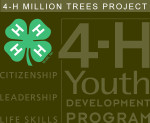
250,000 members
30,000,000 trees

Trees selected for planting must be chosen carefully to grow well in each climate zone. Therefore, it is very important that each club works hard to identify the right trees for each location. We believe that planting trees that are both native to the region and locally adapted is the best way to ensure survival.
4-H in the U.S. is part of the Cooperative Extension of the land grant university in each state. The Cooperative Extension generally has agents who are botanical experts and are pleased to share their knowledge, particularly with youth interested to learn. There is a very useful site where you can click your state and county to obtain contact information for your local 4-H leaders at http://www.4-h.org/get-involved/find-4-h-clubs-camps-programs/. Or use the links on your state 4-H website, or contact your County Rep/Agent to find the Extension specialist in your county who can help.
Many counties have master gardener programs where knowledgeable individuals contribute to their communities. We encourage 4-Hers seeking local botanical knowledge to learn about and take advantage of their county's master gardener program. Check your county Cooperative Extension website for more information.
Each 4-H club is responsible for sourcing trees for their tree planting projects. Local nurseries are a good bet to find trees that will grow well in your area, and they may be willing to provide trees at wholesale prices for nonprofit tree planting projects. Alternatively, it is possible that the University Extension agent in your county has access to or can suggest local sources of seedlings, saplings, or young trees that could be transplanted into locations selected by each 4-H entity. This is a good way to be certain the tree species planted are suitable for your climate. In addition, youth can learn proper care for the trees from the agents.
4-Hers who have the interest to propagate their own seeds can help to reduce costs, while extending the learning experience of the project. Plus, raising a tree from a seed is hugely satisfying. We highly recommend that individuals with a green thumb, or ones that want to try something new, get seeds for suitable tree species, and try their luck. Again, expert advice is available for the asking from agents and specialists at your county 4-H office, or through the Cooperative Extension service. For a great example, check The 4-H Oak Tree Project website, prepared by Merced County, California 4-H.